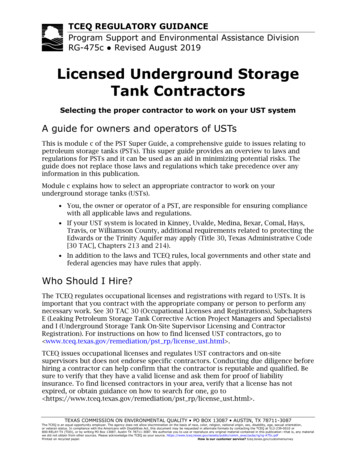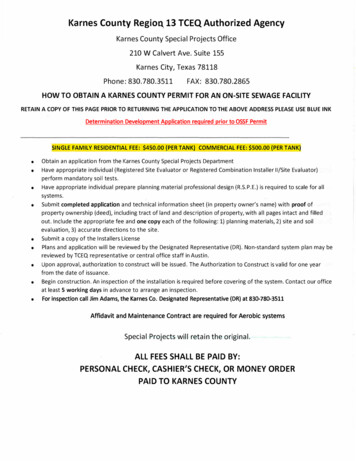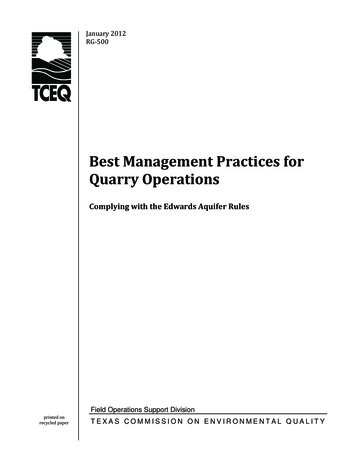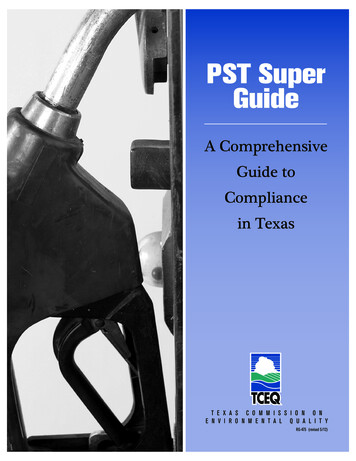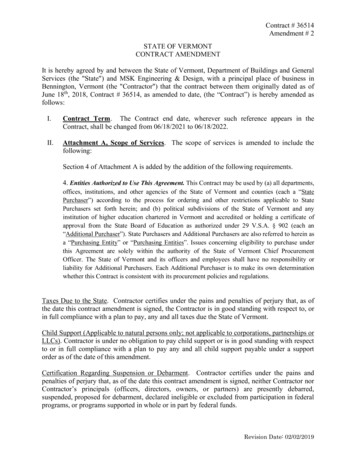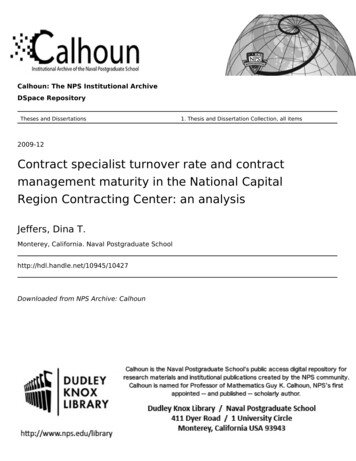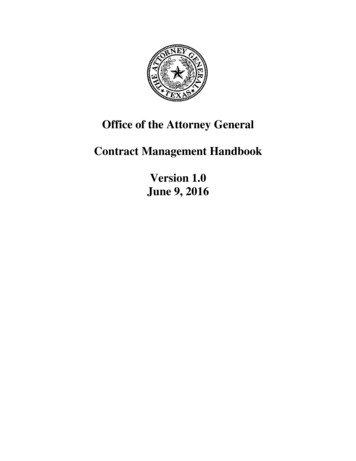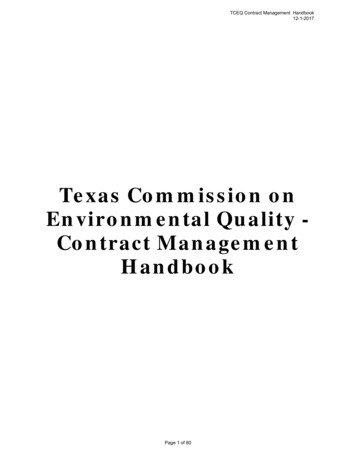
Transcription
TCEQ Contract Management Handbook12-1-2017Texas Commission onEnvironmental Quality Contract ManagementHandbookPage 1 of 80
TCEQ Contract Management Handbook12-1-2017Table of ContentsChapter 1:Overview of Contract ManagementChapter 2:EthicsChapter 3:PlanningChapter 4:Post-Award ConferenceChapter 5:Monitoring PerformanceChapter 6:Payment ApprovalChapter 7:Change ManagementChapter 8:Dispute ResolutionChapter 9:Records, Maintenance and RetentionChapter 10:Closeout of ContractAdditional Resources and DocumentationAppendixPage 2 of 80
TCEQ Contract Management Handbook12-1-2017Who should review thishandbook?Per Government Code Sec. 2261.256, TCEQ has created a Contract ManagementHandbook to be used by those employees that manage contract functions. However,within TCEQ, many of the contract management functions are performed by differentindividuals within each of the offices, divisions and program areas. The employees whoparticipate in these functions can have various titles and classifications other than“contract manager.” Thus, this handbook is designed to provide a general overview ofcontract management for all the employees who participate in managing a contract.Source GuidesThe following are the source guides for this handbook: Statutory Sourceso Competitive Sealed Proposals (RFP) Gov’t Code 2156, Subchapter Co Scientific & Technical Environmental Services (RFP) Section 5.2291 (b) TexasWater Code, Chapter 2254 Gov. Code, Subchapter Ao Purchase of Automated Information Systems (RFO) Gov’t Code 2157o Professional and Consulting Services (RFQ) Gov’t Code 2254o Authority to Award Grants (RFGA) Texas Water Code, Chapter 5, Section 5.124o Biddable Goods and Services (IFB) Gov’t Code 2155 CPA Contract Management Guide Agency Guidanceo OPP 3.12 Contractso OPP 12.08 Employee Ethicso Guide for Administrative Procedures (GAP) Chapter 2.N Procurements andContractso Multiple User Manuals found on the TCEQ Contract and Purchasing Webpage Agency approved contract terms and conditionsPage 3 of 80
TCEQ Contract Management Handbook12-1-2017Chapter 1: Overview ofContract ManagementPage 4 of 80
TCEQ Contract Management Handbook12-1-2017Contract Management ResponsibilitiesThe primary functions of contract management include: Participating in developing the solicitation and writing the draft statement of work,identifying specifications for and deliverables to be required, identifying needsunique to the contract that may require special terms and conditions and othercontract documents .Determining during solicitation development if the Contractor’s compensationstructure is appropriate for the work.Serving as the point of contact for disseminating the instructions regarding thework to the Contractor.Receiving and responding to communications between TCEQ and the Contractor.Managing, documenting, and ensuring appropriate approval of any changes to thecontract.Managing any state property used in contract performance, e.g., computers,telephones, identification badges, etc.Identifying and resolving disputes with Contractor in a timely manner.Implementing a quality control/assurance process.Maintaining appropriate records.Documenting significant events.Monitoring the Contractor’s progress and performance to ensure goods and servicesconform to the contract requirements.Exercising state remedies, as appropriate, when a Contractor’s performance isdeficient.Monitoring the budgeting and accounting process to ensure sufficient funds areavailableVerifying accuracy of invoices and authorizing payments consistent with thecontract terms.Performing contract closeout process ensuring the contract file contains allnecessary contract documentation, formal acceptance is documented, and lessonslearned are documented.Contract management functions generally do not include the following: Instructing the Contractor to start work before the contract or work order is fullyexecuted.Changing the scope of the contract without doing so through the formal amendmentprocess.Directing the Contractor to perform work that is not specifically described in andfunded by the Contract.Extending the time period of the contract without execution of an approvedamendment.Page 5 of 80
TCEQ Contract Management Handbook12-1-2017 Allowing the Contractor to incur any additional costs over the stated value of thecontract, work order, or task order unless such contingent or emergency costs arespecifically identified in the contract.Contract management and oversight includes seven (7) general processes, which arediscussed in this handbook:1.2.3.4.5.6.7.PlanningMonitoring PerformanceChange ManagementPayment ApprovalDispute ResolutionRecords ManagementContract CloseoutPage 6 of 80
TCEQ Contract Management Handbook12-1-2017What is my Role?Contract Management refers to the entire contracting process from planning tocloseout. This includes tracking tasks: monitoring vendor performance, invoicepayment processing, negotiating amendments, assessing penalties, and updatingcontract data. At TCEQ, the Procurements and Contracts section staff, Legal, ProgramArea and the HUB staff work together during the planning phase for a solicitationand/or contract development. Once the contract has been awarded, it is theresponsibility of the Program Area to administer the contract.Roles and Responsibilities1. Program Areaa. Understands Contractb. Manages Contractorsc. Manages the operational aspects of the contractd. Receives goods and processes receiving reports in BAMSe. Reviews and processes invoices in BAMSf. Verifies costs are within approved budgetsg. Manages financial obligation of vendorh. Ensures insurance and bonding requirements are being meti. Requests contract and budgetary amendmentsj. Requests amendments to HUB Subcontracting Plan (HSP) when necessaryk. Initiates and manages work orders and task ordersl. Completes contractor/vendor performance evaluations and submits them toP&Cm. Notifies Legal and P&C of performance issues and monitors corrective actionplansn. Performs risk based routine and enhanced monitoringo. Periodically perform risk assessments throughout the life of the contractp. Monitors fundingq. Monitors contract budget2. Procurements and Contracts (P&C)a. Facilitates and provides technical assistance on state procurement law andoptions for contracting for the Agencyb. Works with Program Areas and Legal to create procurement documents such assolicitations and contractsc. Creates and maintains official procurement file (hard copy and/or PACEautomated)d. Processes contract amendments and change requestse. Reviews and approves work orders and task orders documentationPage 7 of 80
TCEQ Contract Management Handbook12-1-2017Requests Program Area to provide vendor performance documentationEnters vendor performance evaluations into CPA portalPartners with Legal to review and approve insurance and bonding requirementsPublishes and reports contract information to the public and state oversightagenciesj. Provides training on procurement requirements and contract managementfunctions to the Agency.k. Partners with Legal to determine risk factors during the solicitation processl. Provides guidance during the solicitation processf.g.h.i.3. Legala. Provides legal assistance on procurement laws and regulations to P&C and theProgram Areasb. Assists in the development, review and approval of solicitation, contract andamendment documentsc. Provides legal support for contract negotiationsd. Provides legal assistance for vendor performance concerns, including initiatingremedies and defending disputese. Assists in the development, review and approval of subsequent contractdocuments such as amendments, work orders and task ordersf. Partners with P&C to review and approve insurance and bonding requirementsg. Partners with P&C to determine risk factors during the solicitation process4. HUBa. Reviews and approves program area identified HUB opportunities for contractsb. Reviews and approves HUB Subcontracting Plan (HSP) and HSP amendmentsPage 8 of 80
TCEQ Contract Management Handbook12-1-2017CommunicationKey factor to a successful contract is communication. It is essential individuals engagedin contract management activities to understand the provisions of the contract, have theability to communicate contract obligations to all parties involved, and maintain controlover the performance of the contract.Good contract management include ensuring that the contract requirements aresatisfied, that the goods and services are delivered in a timely manner, and that thefinancial interests of TCEQ are protected. Individuals engaged in contract managementactivities must have sufficient knowledge of contracting principles as it relates to theirresponsibilities in administering the contract. It is the Contractor’s responsibility toperform and meet the requirements of the contract. To do so, Contractors sometimesneed technical direction and approval from TCEQ personnel. Individuals engaged incontract management activities must provide this technical direction and approval in atimely and effective manner established by each Program Area. All guidance provided toa Contractor must be within the scope of the contract. The individuals engaged incontract management activities must be careful to not impose additional requirementsupon the Contractor or manage the Contractor’s operations to the extent that theContractor is relieved of their responsibility to perform. It is important to document allcommunication with your Contractor.If there are any unresolved issues, please contact P&C and Legal for guidance onworking with the Contractor on a solution.Page 9 of 80
TCEQ Contract Management Handbook12-1-2017Chapter 2: EthicsPage 10 of 80
TCEQ Contract Management Handbook12-1-2017Conflicts of Interest and Required DisclosuresThe standards of conduct that apply to all state government employees includes,“It is the policy of this state that a state officer or state employee may not have adirect or indirect interest, including financial and other interests, or engage in abusiness transaction or professional activity, or incur any obligation of anynature that is in substantial conflict with the proper discharge of the officer’s oremployee’s duties in the public interest.”See OPP 12.08, Employee Ethics, for more information on the standards of conduct.State law specifically prohibits employees who participate in the procurement processfrom having an interest in or receiving benefits from a contract or bid for a purchase ofgoods or services. Moreover, employees of agencies who perform purchasing functionsunder delegated authority shall adhere to the same ethical standards as theComptroller’s employees, and shall avoid all conflict of interest in their purchasingactivities. TCEQ’s purchasing staff annually certify compliance with these provisions ona Conflict of Interest form, which is maintained by P&C.To ensure the integrity of TCEQ’s procurement processes, TCEQ employees who areinvolved in the development, award and management of contracts with private vendorsmust disclose any known or potential conflicts of interests. An employee may not workon a contract knowing that the employee, or member of the employee’s immediatefamily, has an actual or potential financial interest in the contract, including but notlimited to, prospective employment. The term “participate” includes, but is not limitedto, decision making, approval, disapproval, recommendation, giving advice,investigation or similar action.Employees who participate in the procurement process will be asked to make thesedisclosures and sign a Procurement Ethics Form. For major contracts for the purchaseof goods and services, state law also requires the completion of a Disclosure Statementfor Purchasing Personnel, which is also referred to as the Nepotism Disclosure form.Additionally state law prohibits contracts over 25,000 with private vendors for goodsand services where certain agency officials have a financial interest. Accordingly,TCEQ’s Commissioners, Executive Director, General Counsel and chief procurementofficer will regularly review and disclose any known financial interests with the agency’sprivate vendors to ensure that the agency does not contract with those vendors.VendorsVendors may not offer, give or agree to give a state employee anything of value. Any giftor benefit must be declined by a state officer or state employee.Page 11 of 80
TCEQ Contract Management Handbook12-1-2017During the procurement process, TCEQ requires potential vendors to certify anddisclose any known conflicts of interest, including any proposed personnel who areformer TCEQ, employees, related to any current employees of TCEQ, and any knownfinancial interest of, or foreseeable financial benefit to, any TCEQ commissioner,executive director, deputy executive director, general counsel or chief procurementofficer, and their family members.TCEQ’s contract terms also address conflicts of interest and require vendors to providenotice to TCEQ of any actual, apparent, or potential conflict of interest regardingContractor or any entity or individual performing any portion of the Work. TCEQretains sole discretion to determine the existence and remedies for any conflict.Suspected Fraud Waste and AbuseEmployees who are involved in the procurement process or contract management havethe duty to report any potential fraud, waste or abuse by a vendor in accordance withOPP 3.10, Reporting Allegations of Fraud, Waste and Abuse.Revolving DoorThere are two statutes that place some limits on the future employment of state employees whoworked on contracts. The first is the general subject matter statute that prohibits an employeefrom working on the same particular matter after leaving state employment. The second is abroader restriction on working for a vendor. An employee who, during the period ofemployment, participated on behalf of TCEQ in a procurement or contract negotiation, may notaccept employment with that vendor the two years following the date the contract is signed, orthe procurement is terminated or withdrawn. See OPP 12.08, Employee Ethics, and the EthicsSharenet page for more information on these revolving door statutes.Page 12 of 80
TCEQ Contract Management Handbook12-1-2017Chapter 3: PlanningPage 13 of 80
TCEQ Contract Management Handbook12-1-2017Chapter 3 OverviewPlanning is important to a successful contract. A successful contract is one where thecontract is satisfactorily performed and the responsibilities of all parties are completedby the end of the contract. That success starts with the initial plan for the contract and adraft statement of work.The initial statement of work is a clear description of the goods and services that TCEQwill require the Contractor to deliver, the acceptability standards for those goods andservices, the delivery dates, and the cost of those goods and services. The SOWultimately becomes the roadmap for managing the awarded contract. Thus, theindividual(s) that will be responsible for managing the contract are important partnersin the development of a good SOW. By participating in planning, the individual(s)responsible for managing a contract know and understand the contract provisions, cancommunicate those contract obligations to the Contractor and maintain appropriateoversight and control over the contract performance.Chapter 3 lists the different types of procurement methods used to award a contract,different types of contracts, and outlines how to create a statement of work.Page 14 of 80
TCEQ Contract Management Handbook12-1-2017Types of Solicitations and ContractsSolicitation:A solicitation is a document requesting submittal of bids or proposals for goods orservices in accordance with the advertised specifications. When advertising asolicitation, the agency announces the need for a good or service on the Electronic StateBusiness Daily (ESBD). Advertising allows TCEQ to try and obtain the best product,service, quality, quantity, delivery and pricing to meet or exceed our needs through thecompetitive process.For more information on the solicitation process, you can review the CPA’s ContractManagement Guide.What Kind of a Solicitation Should I Choose?It is important to determine the procurement method as it will be a major factor in theplanning process. For example, the procurement lead time for an Invitation for Bid anda Request for Proposal differ significantly. The different types of solicitations are listedbelow:Invitation for Bids (IFB) - The IFB uses the competitive sealed bid method. Thismethod is used when the requirements are clearly defined, negotiations are notnecessary and price is the major determining factor for selection. Best valueconsiderations can also be used with the IFB method. Use when lots of competitionexists, and the product or service is available from more than one source. Advantage: Award process is simpler, and award is made to the lowest responsive,responsible bidder meeting the bid qualifications. This provides the best value tothe state. Disadvantage: Defined specifications may be difficult to develop and does notencourage innovative solutions. Planning/Management: When developing the IFB solicitation document, thinkabout the following:o What are the minimum qualifications or criteria for the vendor, i.e. number ofyears of experience or has done this type of work in the past.o Are there any other best value or preferences that would be used in thesolicitation?o Are there any deliverables? What is the format of the deliverable?o How do you want to be invoiced for the work?o How are you going to monitor your contract or purchase order?o What are the performance measures that are going to be used in the contract orpurchase order to know if the contract or purchase order was successful?Request for Information (RFI) - Requests for Information are used primarily as aplanning tool. The RFI is an optional method that may be used to gather information inorder to prepare a complete and accurate solicitation document when the agency doesPage 15 of 80
TCEQ Contract Management Handbook12-1-2017not have the necessary information needed. RFI’s are used to identify industrystandards, best practices, potential performance measures, cost or price structures, or togenerally ascertain the level of interest of prospective respondents. A preliminarysolicitation document which provides an initial description of the program objectivesand specifications usually accompanies an RFI for review by potential respondents.TCEQ may use the information derived from the responses to finalize their solicitationdocument. However, TCEQ is not required to incorporate the comments or suggestionsmade by the respondents to the RFI, but the hope is that the respondents to the RFI willprovide useful information in the development of a new solicitation. Use when there isinsufficient information to write specifications for any procurement method. Advantages: Provides information to prepare a complete bid or proposaldocument that allows the business community to have input into the agency’ssolicitation document based on current industry practices and market factors andinforms the agency of any potential problems early in the procurement. Disadvantages: Lengthens the procurement process because a contract cannot beawarded from an RFI. Planning/Management: When creating an RFI, think about the following:o What is the final result of the project? Do you want a software program that produces a particular report withcertain criteria? Do you want a contract in place that allows your program area to meet aLegislative requirement?o What information do you want to gather? Pricing Technical Approach InterestRequest for Offer (RFO) – Generally used for IT Commodity Purchases exempt fromthe DIR’s Cooperative (Co-op) Contracts program. The process is generally the same asthe RFP process. Request for Offer purchases include the purchase of automatedinformation systems and are covered under Texas Administrative Code, Title 34,§20.391. Use when factors other than price are evaluated. When negotiations are desiredand/or vendor is expected to provide innovative ideas. Advantages: Allows factors other than price to be considered, allows forcustomized proposals suggesting different approaches to the same business needand allows for negotiations in order to obtain the best value for the state. Disadvantages: Lead times for procurement are much greater. Evaluations aremore complex and subjective. Planning/Management: An RFO has an inherent higher risk than mostsolicitations. When creating an RFO, think about the following:o What is the final result of the project? Do you want a software program that produces a particular report? What information must be used to obtain the final product?o Can the project be done in phases?o What are the acceptance criteria?Page 16 of 80
TCEQ Contract Management Handbook12-1-2017ooooooooooWhat is your change management process?What is your communication plan?Are there reporting requirements?What are the assumptions for this project?Are there any deliverables? What is the format of the deliverable?How do you want to be invoiced for the work? Is this a deliverable based project;a time and material based project; or a progress based project? And how do youknow what has been invoiced has met acceptance and performance criteria?How are you going to monitor your contract or purchase order’s performance?How frequently are you going to audit the Contractor’s work?What are the performance measures that are going to be used in the contract orpurchase order to know if the contract or purchase order was successful?What happens if the Contractor does not perform to the contract standards?Request for Proposal (RFP) – Used when competitive sealed bidding is notpracticable or advantageous. Generally this is when factors other than price are to beconsidered or when objective criteria cannot be defined. One of the key differencesbetween an IFB and an RFP is that negotiations are allowed in an RFP and not allowedin the IFB. Discussions are allowed with the respondents and best and final offers maysolicited. Unless otherwise exempted, agencies may need to submit their RFPs to CPAfor review prior to solicitation and this will add additional time in the procurementprocess. Please get with your P&C contact to see if this is necessary. Use when factorsother than price are evaluated. When negotiations are desired and/or vendor is expectedto provide innovative ideas. Advantages: Allows factors other than price to be considered, allows forcustomized proposals suggesting different approaches to the same business needand allows for negotiations in order to obtain the best value for the state. Disadvantages: Lead times for procurement are much greater. Evaluations aremore complex and subjective. Planning/Management: When creating an RFP, think about the following:o What is your change management process? Is there a need for a SACR clause?o What is your communication plan?o Are there reporting requirements?o Are there any deliverables? What is the format of the deliverable?o How do you want to be invoiced for the work? And how do you know what hasbeen invoiced has met acceptance and performance criteria?o Do you need a special condition for adding like and similar work?o How are you going to monitor your contract performance?o How frequently are you going to audit the Contractor’s work?o What are the performance measures that are going to be used in the contract toknow if the contract was successful?o What happens if the Contractor does not perform to the contract standards?o What are the risks in this contract and how can you mitigate them?Request for Qualifications (RFQ) – Generally used for Professional Serviceswherein the respondents are evaluated based solely on their qualifications. Price is notPage 17 of 80
TCEQ Contract Management Handbook12-1-2017considered until after selection is made by the agency based on qualifications.Professional Services are covered under Texas Government Code §2254. Use whenselection is made solely on the skills and qualifications of the Contractor. Price is not afactor until after the vendor is selected. Advantages: Emphasizes the competency of the proposed Contractors.Disadvantages: Contractor is selected before a price is negotiated.Planning/Management: When creating an RFP, think about the following:o How will you evaluate a company’s qualifications?o What documentation do you need to evaluate to know if the company is wellqualified? Financial Statement Key Personnel Resumes Copies of licenses or certificates ReferencesProprietary ContractProprietary product or service is one that is manufactured or offered under exclusive rightsof ownership, including right under patent, copyright, or trade secret law. A product orservice is proprietary if it has a distinctive feature or characteristic that is not shared orprovided by competing or similar products or services. A sole source product or service isavailable through only one source or vendor.A justification for a proprietary purchase is required when an agency needs to purchasea non-state contract item costing 5,000 or more and the specification limitsconsideration to one manufacturer, one product that may be available from manysources, or one service provider.The proprietary purchase process should be used sparingly. TCEQ Program Areasshould consult with P&C staff prior to beginning any proprietary purchases. P&C staffwill consult with Legal as appropriate.For more information you may refer to the Proprietary Purchase User Manual found onthe TCEQ Purchasing and Contracting ShareNet page and the CPA ProcurementManual, Section 2.15.Emergency ContractEmergencies occur as the result of unforeseeable circumstances and may require animmediate response to avert an actual or potential public threat. If a situation arises inwhich compliance with normal procurement practice is impracticable or contrary to thepublic interest, an emergency purchase may be warranted to prevent a hazard to life,health, safety, welfare, property or to avoid undue additional cost to the state.Notwithstanding the immediate nature of an emergency, all procurements conducted asemergencies should be made as competitive as possible under the circumstances. If anemergency exists, a written determination of the basis for the emergency and for theselection of a particular vendor shall be included in the procurement file in accordancePage 18 of 80
TCEQ Contract Management Handbook12-1-2017with this section. Emergency purchases of goods or services should not exceed the scopeor duration of the emergency. If this type of situation arises, a justification foremergency purchase may be warranted to prevent hazard to life, health, safety, welfare,property or to avoid undue additional cost to the state. Refer to CPA's ProcurementManual, Section 2.12.Multiple Contracts (Awards) from One SolicitationIn some cases, the agency may want to award to multiple vendors from one solicitation.We call this a multiple award solicitation. The process starts out the same as a regularsolicitation, but we announce in the documentation that we are planning on awardingmore than one contract/PO.Umbrella ContractTCEQ uses umbrella contracts frequently. They are a good tool if you will be doing a lotof the tasks with the same Contractor over a long period of time. An Umbrella contractcommits the Contractor to TCEQ without obligating any funds until a work order isissued. Under an umbrella contract, work cannot begin (except for development of awork plan in response to the work order) until a Notice to Proceed (NTP) or Work Orderhas been issued on a particular work order.TCEQ may have umbrella contracts in place which are available for Agency-wide use.Two major benefits of opening umbrellas contracts to the whole Agency are to reduceAgency costs and minimize the procurement process. Please consult with your assignedP&C representative when considering the use of an existing umbrella contract asadditional approvals will be required.Work Orders:To issue a work order you must have a contract/PO that specifically states that it is anumbrella and that work orders will be issued to obtain the service. Work orders can bephases of work, tasks that build upon one another or individual services related to theoverall umbrella. A benefit to an umbrella contract is that you can control the progressof the Contractor.The work order process is as follows: TCEQ will send a work order request to the Contractor and direct it to provide awork plan in response. In most cases, the work order request must have priorapproval from P&C and Legal before being sent.You will want to include a statement or scope of work (SOW) that you want theContractor to perform. To help you create the SOW, please refer to the section onStatement of Work.Page 19 of 80
TCEQ Contract Management Handbook12-1-2017 The Contractor will send TCEQ a work plan that outlines the tasks to be performed,how the tasks are to be completed, the time it will take to complete the tasks, andthe amount of money to complete all the work in the work order.TCEQ and Contractor can negotiate the terms and items within the work plan.Once there is an approved work plan, TCEQ will issue a Notice to Proceed (NTP).No work can begin without a notice to proceed. The work order process for an existing Umbrella Contract not managed by yourprogram is as follows:The process will ultimately be the same as stated above but a few things must happenprior to a Work Order being sent to the Contractor: Contact your P&C representative to discuss the possibility of issuing work order(s)using an existing umbrella contract managed outside your program.P&C will coordinate the communication between you and the contract/projectmanager for the umbrella cont
Contract Management Responsibilities . The primary functions of contract management include: Participating in developing the solicitation and writing the draft statement of work, identifying specifications for and deliverables to be required, identifying needs unique to the contract that may require special terms and conditions and other
